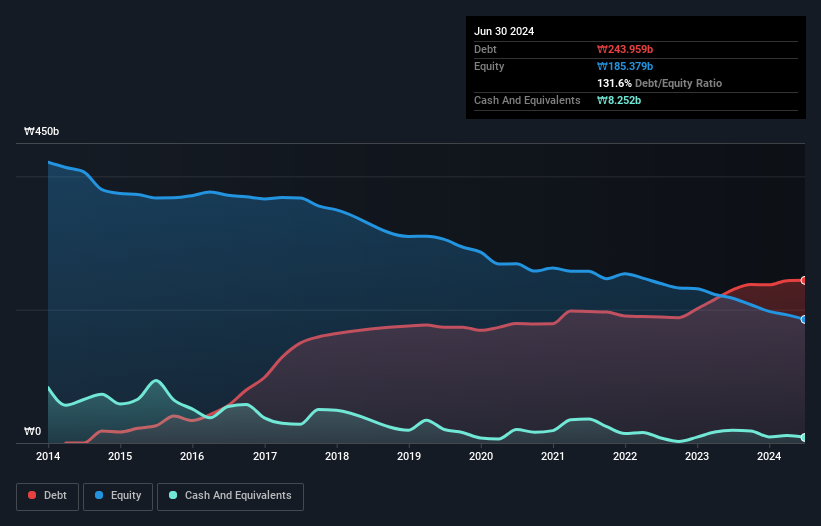- South Korea
- /
- General Merchandise and Department Stores
- /
- KOSE:A006370
Health Check: How Prudently Does Daegu Department Store (KRX:006370) Use Debt?
The external fund manager backed by Berkshire Hathaway's Charlie Munger, Li Lu, makes no bones about it when he says 'The biggest investment risk is not the volatility of prices, but whether you will suffer a permanent loss of capital.' So it might be obvious that you need to consider debt, when you think about how risky any given stock is, because too much debt can sink a company. As with many other companies Daegu Department Store Co., Ltd. (KRX:006370) makes use of debt. But should shareholders be worried about its use of debt?
When Is Debt A Problem?
Debt is a tool to help businesses grow, but if a business is incapable of paying off its lenders, then it exists at their mercy. In the worst case scenario, a company can go bankrupt if it cannot pay its creditors. However, a more common (but still painful) scenario is that it has to raise new equity capital at a low price, thus permanently diluting shareholders. Of course, the upside of debt is that it often represents cheap capital, especially when it replaces dilution in a company with the ability to reinvest at high rates of return. The first step when considering a company's debt levels is to consider its cash and debt together.
See our latest analysis for Daegu Department Store
How Much Debt Does Daegu Department Store Carry?
As you can see below, at the end of June 2024, Daegu Department Store had ₩244.0b of debt, up from ₩229.8b a year ago. Click the image for more detail. However, it also had ₩8.25b in cash, and so its net debt is ₩235.7b.

How Strong Is Daegu Department Store's Balance Sheet?
According to the last reported balance sheet, Daegu Department Store had liabilities of ₩144.4b due within 12 months, and liabilities of ₩132.6b due beyond 12 months. Offsetting these obligations, it had cash of ₩8.25b as well as receivables valued at ₩5.61b due within 12 months. So it has liabilities totalling ₩263.1b more than its cash and near-term receivables, combined.
The deficiency here weighs heavily on the ₩67.8b company itself, as if a child were struggling under the weight of an enormous back-pack full of books, his sports gear, and a trumpet. So we definitely think shareholders need to watch this one closely. After all, Daegu Department Store would likely require a major re-capitalisation if it had to pay its creditors today. When analysing debt levels, the balance sheet is the obvious place to start. But it is Daegu Department Store's earnings that will influence how the balance sheet holds up in the future. So if you're keen to discover more about its earnings, it might be worth checking out this graph of its long term earnings trend.
In the last year Daegu Department Store had a loss before interest and tax, and actually shrunk its revenue by 11%, to ₩64b. That's not what we would hope to see.
Caveat Emptor
While Daegu Department Store's falling revenue is about as heartwarming as a wet blanket, arguably its earnings before interest and tax (EBIT) loss is even less appealing. Indeed, it lost a very considerable ₩16b at the EBIT level. If you consider the significant liabilities mentioned above, we are extremely wary of this investment. That said, it is possible that the company will turn its fortunes around. But we think that is unlikely, given it is low on liquid assets, and burned through ₩28b in the last year. So we consider this a high risk stock and we wouldn't be at all surprised if the company asks shareholders for money before long. There's no doubt that we learn most about debt from the balance sheet. But ultimately, every company can contain risks that exist outside of the balance sheet. To that end, you should learn about the 4 warning signs we've spotted with Daegu Department Store (including 2 which are concerning) .
Of course, if you're the type of investor who prefers buying stocks without the burden of debt, then don't hesitate to discover our exclusive list of net cash growth stocks, today.
New: Manage All Your Stock Portfolios in One Place
We've created the ultimate portfolio companion for stock investors, and it's free.
• Connect an unlimited number of Portfolios and see your total in one currency
• Be alerted to new Warning Signs or Risks via email or mobile
• Track the Fair Value of your stocks
Have feedback on this article? Concerned about the content? Get in touch with us directly. Alternatively, email editorial-team (at) simplywallst.com.
This article by Simply Wall St is general in nature. We provide commentary based on historical data and analyst forecasts only using an unbiased methodology and our articles are not intended to be financial advice. It does not constitute a recommendation to buy or sell any stock, and does not take account of your objectives, or your financial situation. We aim to bring you long-term focused analysis driven by fundamental data. Note that our analysis may not factor in the latest price-sensitive company announcements or qualitative material. Simply Wall St has no position in any stocks mentioned.
About KOSE:A006370
Daegu Department Store
Engages in the operation of department stores in South Korea.
Low risk and overvalued.
Market Insights
Community Narratives




